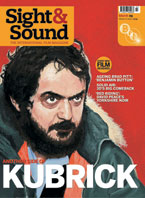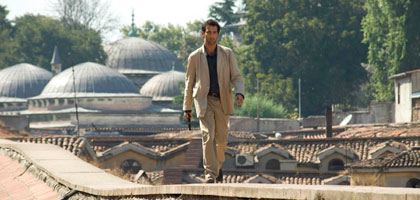Primary navigation


With blistering action set pieces and a downbeat hero in the shape of Clive Owen, Tom Tykwer's new espionage thriller 'The International' plays like a deglamorised, back-to-basics Bond. By Samuel Wigley
After excited public speculation that Clive Owen would succeed Pierce Brosnan as cinema's least repressible secret agent was quashed by the casting of Daniel Craig in Casino Royale (2006), Owen good-humouredly appeared in the calamitous remake of The Pink Panther (2006) as one Nigel Boswell, Agent 006, who Inspector Clouseau jokes is "one short of the big time".
Owen gave a good account of himself in a tuxedo, albeit on the other side of the gambling table, in the title role in Mike Hodges' Croupier (1997). He had looked comfortable behind the wheel of a roadster as the enigmatic driver in The Hire (2001-2), a sequence of high-profile advertisements guest-directed for BMW by a series of world-class film-makers. He'd appeared as a ruthless intelligence operative in The Bourne Identity (2002), the first of the series of kinetic Robert Ludlum adaptations that would force the Bond franchise to raise its game. Now, Tom Tykwer's globetrotting intelligence thriller The International has all the makings of an expensive consolation project; one in which - because its dogged hero experiences little of the playboy-spy highlife and his jet-setting, from Berlin to Milan to New York to Istanbul, is abstemious by 007 standards - Owen could be said to have drawn the short straw.
Consolation prize or not, Tykwer's film is one of the most entertaining espionage dramas in an age. In a marketplace crowded with instalments of Bond and Bourne, The International feels neither as glamorous nor as relentlessly energetic as its obvious rivals, with Owen's grizzled, raincoated Interpol agent Louis Salinger closer to the NHS-spectacled Harry Palmer spy pedigree. Keeping a lid on comic-book excess, rooted in a cogent if run-of-the-mill intrigue and concentrated around plausible yet still astonishing set pieces, the result plays something like the idealised back-to-basics Bond film that Fleming fans carry around in their heads.
Not that Tykwer can't sprint with the best of them in terms of sugar-rush action film-making. If European cinema can offer an experience as relentless as the Bourne films, or as close to narrative hyperventilation, then it is his Run Lola Run (1998), which dashes through three possible outcomes for its title heroine's attempt to recover 100,000 marks of gangland money within a 20-minute deadline. Tykwer made his reputation with this breathless, techno-fuelled twist on the trisected structure of Krzysztof Kieslowski's Blind Chance (1981), though interestingly it was the Kieslowskian preoccupation with fate and chance rather than the attention-deficient formal tropes that proved the lasting characteristic of his succeeding work. But even in Heaven, the 2001 film Tykwer made from one of the late Polish director's unfilmed screenplays, the disquisitions into death and destiny come preceded by a masterfully controlled opening gambit - following Cate Blanchett's composed activist Philippa up into an Italian skyscraper to plant a bomb in one of its offices - during which the ticking away of time is felt as keenly as in any Hollywood suspense-wringer.
The International opens with similarly nerve-wracking efficiency. Walking away from an apparently successful backseat meeting with a representative of the International Bank of Business and Credit (IBBC), an undercover colleague signals to Salinger across the road that the bait has been taken. Then, with Salinger a helpless witness behind streams of traffic, the agent is ominously brushed past by a pedestrian. Collapsing to the pavement, a victim of fast-acting poison, he breathes just long enough for Salinger to cross the road and come futilely to his aid.
In setting Salinger against a sinister Luxembourg bank which is spreading a global network of influence by bankrolling foreign conflicts and terrorism, scriptwriter Eric Warren Singer has lucked upon a topical source of unease, with the organisation's charm-schooled executives a resonant adversary for our economically bedevilled times. It would be easy to make too much of this zeitgeist-surfing serendipity, as little of the film's impact would have been lost had the villains been old-school communists or some long-in-the-tooth terrorist group. Still, this credit-crunch frisson sustains the crisp, contemporary feel conjured by the pellucid camerawork of Tykwer's regular DP, Frank Griebe. Full of his trademark bird's-eye aerial shots emphasising the gridded entrapments of the city, Griebe's cinematography revels in the anonymous corporate modernism of a Central European business world.
Where The International stumbles as conventional movie entertainment is in its over-egged seriousness. Owen gives a potent, muscular performance as the agent going beyond duty and legality to fathom the IBBC's corruption, yet never cracks so much as a smile. Called upon to play incensed for the entire running time, his face seems ossified into a grimace of no-shit determination. Likewise, Naomi Watts as his District Attorney collaborator, Eleanor Whitman, gets little to do except mouth mission-speak and train every expression to look as if her life depended on it. Apart from one notable exception (when Salinger convinces a dope-smoking GP to talk to him by playing on his druggy paranoia), Tykwer's film is as humourless as a bank collapse.
One-liners don't have to be the standard kit of the spy caper, but with tongue firmly out of cheek - and an emphasis on the realistic - it is more difficult to accept certain overly convenient elements in The International's plotting. Tykwer's penchant for those Kieslowskian chance encounters and interlacing destinies resurfaces in the service of lazy storytelling when Salinger and Whitman trace the assassin of an Italian politician to an address in New York (and has a professional killer ever had a more traceable attribute than a custom-made metal leg?). They are foiled when they find the building abandoned, until fate takes a barely credible hand when said hitman simply strolls past them in the street.
Close as the viewer comes to chuckling in the face of the film's contrivances, Tykwer's direction acts on our doubts like a balm, bringing a startling intensity to sequences that could have been commonplace. Witness the Day of the Jackal-style tension of a chillingly incisive assassination in Milan's town square, and the gripping aftermath in which Salinger attempts to get the measure of the incident, lining up the trajectory of the bullet holes to determine the exact vantage point of the marksman.
Scenes at the Blue Mosque in Istanbul and the Guggenheim in Manhattan belong in the spent Hitchcockian tradition of thriller set pieces at tourist landmarks - except that locating a blistering shootout inside the Guggenheim proves inspired, not only for the limitless chances for concealment and attack that Frank Lloyd Wright's spiralling storeys afford, but for the perplexing hall-of-mirrors effect of some of the installations on display and the pointillist trails of bullet holes in the perfect whiteness of the museum's coiling walls. In a bravura touch that's typical of the lift the director brings to his material, this sequence extends well beyond the limits of a slick action tour de force, entering a disquieting realm of realism where the gunfire begins to ring in our ears.
In the tense final section set in the flaring sunlight of Turkey, Salinger is forced to go "outside the system of justice" to bring the bank to book. A line can be drawn to previous Tykwer protagonists who take the law into their own hands - to Philippa's righteous attempt to murder a remorseless drug pusher on whom the carabinieri have turned a blind eye in Heaven, or to Jean-Baptiste Grenouille in Perfume (2006), who is compelled to transcend law and morality in order to distil his ambrosial scent. Compared to such bold and distinctive, if imperfect, projects, The International can't conceal a retreat of personality and ambition on Tykwer's part. At the same time, it is a sure-footed and thrilling sidestep into cinema's mainstream.